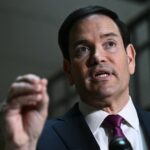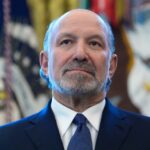
A top Biden administration official responsible for advising the president on policy toward Big Tech companies spent years working in senior positions for Google and Google-backed groups, which critics say raises questions about a potential conflict of interest and the prevalence of the so-called “revolving door” of Washington, D.C. elites shuttling between government and outside special interests.
Alan Davidson has served as the assistant secretary of commerce for communications and information since January 2022, when the Senate confirmed him more than two months after President Biden announced his nomination. In his current role, Davidson also heads the National Telecommunications and Information Administration (NTIA), the agency responsible for advising the president on tech, information, and telecommunications policy.
Before entering the Biden administration, Davidson spent decades working for Google and groups that received Google money — a history that’s raised eyebrows among some D.C. insiders.
“Every time someone spends a bunch of time at a Big Tech company and then goes into the government, there are real questions about how impartial they will be,” said one Democratic operative who spent years working on Capitol Hill. “When you have a public official who worked for one of these companies and is now in a position to influence policy on them, there’s reason to be skeptical.”
From 2005 to 2012, Davidson was Google’s director of public policy for the Americas. During that time, he was the tech giant’s first policy staffer in D.C., where he oversaw the launch and expansion of Google’s office in the nation’s capital. Google also registered its first in-house federal lobbyists in this time and greatly expanded its lobbying operation.
“Within the realm of federal lobbying, Google has gone from a veritable non-entity in the early decade to one of the largest lobbying forces among its peers in the United States,” Dave Levinthal, then a spokesman for the Center for Responsive Politics, said in 2010. “They’re one of the big boys now.”
Davidson himself was registered to lobby for Google from 2007 through 2010, during which time he lobbied Congress and a variety of executive branch offices — including the NTIA. Google also launched its political action committee, NETPAC, under Davidson’s leadership, with him sitting on the board. The point of the PAC, he said in 2006, was “to build relationships with people on both sides of the aisle, particularly whoever’s in the majority.”
The White House in 2010 reprimanded its then-deputy technology chief Andrew McLaughlin for violating ethics rules by inappropriately consulting with his former colleagues at Google, including Davidson. McLaughlin used his personal email account to exchange several messages with Davidson about policy matters related to his work.
In one exchange, Davidson, alerted McLaughlin to potential fallout from his remarks on net neutrality and promised to “tee up” an advocacy group to defend his comments and talk to reporters. The conversation ended when Davidson wrote: “Update on this — haven’t seen anything run yet. We and a few OIC [the advocacy group] folks talked with reporters. It’s possible that killed it, which is probably driving [AT&T] crazy.”
JORDAN SUBPOENAS BIG TECH CEOS FOR RECORDS ON ‘COLLUSION’ WITH BIDEN ADMIN TO ‘SUPPRESS FREE SPEECH’
The 2010 incident led watchdog groups to express concern about Google holding too much sway over Obama administration policy.
Before working at Google, Davidson spent 10 years as the associate director for the Center for Democracy & Technology, which has received millions of dollars from Google since 2010.
After Google, Davidson worked from 2014 to 2018 as a senior staffer at the New America Foundation, which received $21 million from Google, its parent company’s former executive chairman Eric Schmidt, and Schmidt’s foundation.
According to some observers, such history is indicative of D.C. insiders using their influence to move between senior government positions and high-level executive jobs in the private sector, especially in the tech industry.
“The revolving door between Big Tech and the federal government has been pervasive and a huge problem,” said the Democratic operative. “It used to be big pipeline between Wall Street and Democratic administrations. That has transitioned over time to be a revolving door for tech.”
VIRGINIA JUDGE ALLOWS GOOGLE ANTITRUST CASE TO MOVE AHEAD
The idea of a “revolving door” of D.C. elites shuffling from government positions to jobs as lobbyists, consultants and strategists able to influence public policy — and vice versa — has garnered bipartisan outcry. Groups like the Revolving Door Project and others say their explicit mission is to ensure Executive Branch officials use their positions “to serve the broad public interest, rather than to entrench corporate power or seek personal advancement.”
However, critics argue the latter two, rather than serving the public, are too often what motivate top officials.
“The revolving door is a major explainer for how public policy can be skewed from the public interest and in favor of these companies,” said the Capitol Hill veteran, who argued the money in D.C. has gotten “out of control” and is a powerful motivating force for people serving in government and looking to make a pay day once they leave.
“It used to be these people would be talking about money to send their kids through college. Now it’s about buying my third beach house,” said the Democratic source.
One issue that’s raised eyebrows is Davidson in his official capacity namechecking a piece of legislation that would particularly hurt Apple, one of Google’s chief rivals in the tech industry.
In February, the NTIA released a report recommending increased competition in the app marketplace and efforts to combat self-preferencing, when app store operators favor their own apps or discriminate against others by, for example, affecting how they appear in search results.
Davidson told reporters at the time that while the report didn’t endorse any specific legislation to bolster competition, some proposals would address many of the concerns raised by his agency.
“I would note that, you know, many of our recommendations would be answered … and addressed by legislation such as the Open App Markets Act, as it was introduced last year. So, we’ll be looking forward to seeing what comes this year,” said Davidson.
The Open App Markets Act would force Apple and Google to give app developers more power and rights in their app stores, including the ability to “side-load” apps directly onto phones, circumventing centralized approval and a commission fee.
The bill would hurt Google but pose a greater threat to Apple, requiring large-scale changes to the App Stores business model. That’s because Apple operates a more restricted app store than Google Play, which is generally more permissive in allowing users to install apps from rival sources. In contrast, iPhone users can only purchase apps from Apple’s app store.
Plus, Apple brought in revenue of $72 billion from its app store in 2020, nearly twice as much as the $38 billion that Google Play generated that year. In other words, policies impacting app stores could threaten more of Apple’s revenue than Google’s.
The bill gained significant support in Congress but ultimately failed to pass. All four major tech companies — Apple, Google, Amazon, and Meta — spent big money last year lobbying against antitrust reform legislation. However, Apple was especially focused on the Open App Markets Act, which was tied as the most lobbied bill for company lobbyists through the first nine months of last year, according to OpenSecrets.
An NTIA spokesperson rejected the notion of Davidson being entwined in any conflict of interest, arguing he never endorsed any legislation and noting the agency doesn’t regulate any industries but rather advises the president on policy.
AI CONCENTRATING MORE POWER IN BIG TECH’S HANDS, RESEARCHERS WARN
“The U.S. Senate confirmed Assistant Secretary Davidson in a bipartisan, 60-31 vote to lead NTIA, which by law serves as the president’s principal adviser on tech and telecommunications policy matters,” the spokesperson said. “NTIA is not a regulatory agency. Rather, we recommend policy proposals, as we did in our “Competition in the Mobile Application Ecosystem” report.”
“The report,” continued the spokesperson, identified both Google and Apple as gatekeepers over app stores, and recommended changes to how those stores operate to benefit consumers. NTIA did not endorse any legislation in the report.”
According to the Democratic operative, however, Davidson’s situation makes for a potentially messy conflict of interest. He argued the issue isn’t people with corporate experience entering government service but rather addressing the broader system currently in place.
“Private sector experience can be beneficial in government service. The problem is the incentives around the revolving door have spun so far out of control,” the source said. “People who go through the revolving door should be a small part of the leadership team at these agencies, but not necessarily the most vocal and powerful.”
“The agency leadership ranks,” added the operative,” are dominated by people who worked for these companies directly, like Davidson, or people who worked for law firms that represent these companies. People think they’re going to get rich when they push through that door.”
Scroll down to leave a comment:









